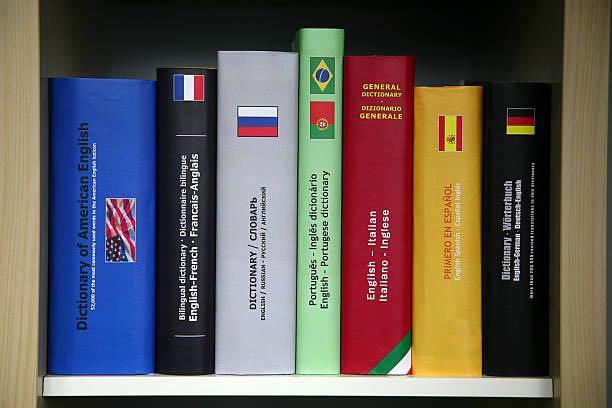The best French/English dictionary is the one that suits your needs and helps you navigate between the two languages easily. Nowadays a broad variety of dictionaries can be found on the market and they offer much more than a simple translation. Some dictionaries are very complete and others may be more minimalist, holding only the essentials of what you need. Before deciding which dictionary is best for you, let’s identify your needs and your purpose.
Ask yourself the right questions:
1. What type of vocabulary are you looking for? For what purpose?
Are you interested in formal vocabulary, everyday language, or slang? Do you need the simple translation of the words, the words used in sentences, typical expressions? Are you interested in more specialized and technical vocabulary?
2. Which French/English format is more appropriate for you?
Are you planning on keeping your dictionary at home in your personal library? Are you planning to travel and thus, do you need a dictionary that’s easy to use and to carry? Is the dictionary for a child or for an adult?
3. How much information for a word ?
Do you want to understand the meaning of the word by seeing the exact word translated or do you prefer to see it in a sentence? Would synonyms help you better and are you interested in the conjugation of the verbs?
When it comes to pronunciation, does the phonetic version of the word help you or would you rather hear it?
4. What Is your learning style?
Are you a visual, auditory, or kinesthetic learner? Would you rather own a classical dictionary full of information to read with small print? A Visual dictionary that would help you associate the word with an image? Would a colorful and spaced out dictionary with bigger print be more helpful?
8 attributes to consider before picking the best dictionary for you:
1. Hardcover, paperback, or apps
Hardcover dictionaries have thick and rigid covers. They are heavier, more durable, larger dimensions and more expensive than paperbacks. They are also enjoyable to browse if you are kinesthetic learner. Paperbacks on the other hand are less durable but also less expensive, more flexible and easier to carry. A dictionary under the form of an app only takes a little space in your cell phone, it only requires an internet connection.
2. Size
A dictionary can be weightless if it’s held in your cell phone (in app form). A physical pocket-size format is easy to carry during your travels. A voluminous format is better sitting on your desk and accessible for a more academic work.
The biggest physical French/English dictionary can be as big as 5.53 lbs (6.75×3.1×9.5 inches) and as small as 0.33 pounds (3.5×0.9×5.30 inches). The biggest ones are usually the most complete while the pocket-size formats are more specific and hold essential vocabulary.
Dictionaries can go from 40,000 to 350,000 entries, choose according to how much you wish to understand the intricacies of French!
3. The level of vocabulary: beginner-intermediate-advanced-professional
Some dictionaries are directed to beginners with fewer words, each with its translation, pronunciation, a sample sentence, and an illustration. Intermediate and advanced users who need more than a concise dictionary can choose dictionaries that provide in-depth coverage of common vocabulary and a broader range of business terminology. If you are a professional and need technical French/English translation, you can find dictionaries covering specialized themes (legal, business, engineering, medical…)
4. Informations associated to the words
The most simplistic French/English dictionary will, at least, give the pronunciation and one or two words associated with the one you want to translate. To get into the nuances of the language, and step up your translation game, synonyms, conjugation, sentences with the use of the word and the etymology of the word can be useful to grasp the deeper meaning of a word.
5. Applications on your device
A wide variety of applications are available on your devices. They may be worth it: lighter and more complete than a pocket-size dictionary, and they can also be accessed for free or for a reasonable price. Just keep in mind that you need an internet connection or data plan in order to access these.
Apps like “wordreference” and “reverso” will allow you to hear the pronunciation of the word rather than having to transcribe the phonetic of the word. They offer the nuances, and the usages of the word in sentences. They give the opportunity to exchange with fellow French/English speakers about the meaning of a word or expressions. You can discuss with native speakers how to translate a certain idea or concept and follow the evolution of the French language compared to the English language.
6. Experienced brands and year of edition
The most common and well known brands in France are “Hachette”, “Larousse” and “Le petit Robert”. Some of those brands collaborated with English dictionary brands like “Oxford” or “Collins” to provide the best translations and information.
Languages evolve so make sure you stay up to date by acquiring the latest edition. Historical Linguists put the time depth for the distinction between languages at about 500 years so the edition before the last should work as well!
7. Layout
French/English dictionaries can be arranged by theme, or most commonly in alphabetical order. They can also be visual, thereby readers can learn about every part of a car, a sewing machine, a telescope, a football field, and thousands of other things.
Some dictionaries use colors and some illustrations, some have cramped text, and some space their definitions out so that they’re easy to read. Choose what you feel comfortable laying your eyes on to make the process of translating to your taste.
8. Age audience
Some Dictionaries are made to be easy and accessible for kids from age 4 and up. They are illustrated with pictures labeled with its English word, followed by its French equivalent. The translated word is followed in turn by a phonetic spelling. Words are grouped according to themes, such as Sports, The Classroom, Fruit, Vegetables, Party Time, Weather, and many others.
Most importantly, choose the best French/English dictionary for you!
The best French/English dictionary depends primarily on what you’re looking from this translation tool. If you’re traveling abroad, you may want to choose a lightweight app. If you’re learning from home, a physical dictionary may be best. Take some time to answer the questions above and find the best version for your needs.
Sophie Cazeneuve


